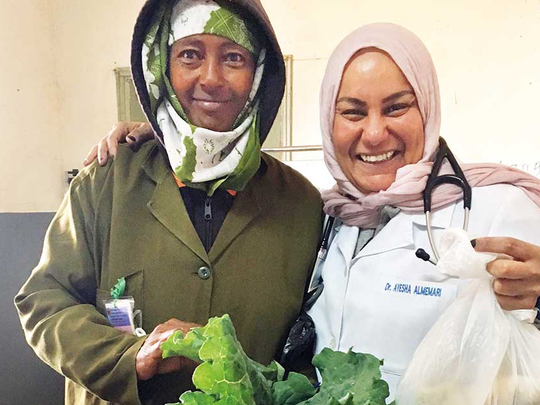
Abu Dhabi: Working as a full-time doctor in Abu Dhabi does not prevent Aisha Al Memari from also dedicating her time to humanitarian work.
The first Emirati physician to specialise in emergency medicine, Al Memari has a long list of accomplishments in the field of medicine and humanitarian work which was recognised last year when she was selected as one of the recipients of the Abu Dhabi Award. To mark World Humanitarian Day which falls on August 19, Gulf News spoke with Al Memari to learn about what motivated her to pick this line of work.
“My initial interest in becoming a physician was so that I could be on the front line and serve my country if a disaster of whatever kind happened. I took this decision when I was 12 years old in 1990, influenced by the Gulf War when, as a child, I felt helpless. So I decided that when I grow up, I should take a line of work that is about getting to work when disaster strikes,” she said.
“I joined the McGill Emergency Medicine Residency programme in 2005, where I was introduced to various emergency medicine sub-specialities, among them international emergency medicine which includes humanitarian services of various kinds, such as serving in disasters or helping developing emergency medicine in rural or underdeveloped areas,” she added.
First test in Yemen
Al Memari’s years of training in emergency medicine were put to test in 2015 when she helped treat Emirati soldiers wounded in Yemen.
“On September 4, 2015, when our military camp in Yemen was attacked, I was grateful to be skilled and trained in emergency medicine, critical care and humanitarian services that equipped me with the skills to help repatriate our injured soldiers to the UAE.
“That was my first true humanitarian response of answering the call of duty and meeting my original goal of taking up medicine as a profession,” she added. Al Memari would later go on to become the first Emirati female doctor to work in a conflict zone.
“When the call came about sending an emergency physician to Yemen, the call of duty took over my fear of conflict zones and I said I had to do this; all my training was to prepare for such a day. I will certainly agree to work in a conflict zone to defend the UAE as part of an international humanitarian contribution,” she added.
Ethiopian experience
Al Memari’s current humanitarian work sees her volunteering with a Canadian NGO in Ethiopia.
“I am helping with developing emergency medicine at a rural hospital in Ethiopia. I work five days per week from 8am to 5pm in the emergency department along with Ethiopian physicians and nurses. I provide consultations to patients and teach the team various emergency medicine skills based on the kind of pathology they see,” she adds.
“Understanding that I was going to work in a limited resource area, I brought my mobile office supply with me to enhance the educational experience, so for every skill and subject I teach, I prepare a clinical information sheet, print and laminate it and give it to the team to use as a reminder and reference,” she said.
Among the main challenges of taking part in humanitarian missions is finding a balance with her full-time job as the emergency programme director and chair of emergency department at Mafraq Hospital.
“Most of the humanitarian assignments are for long periods which makes them a challenge as I have a full-time, demanding job. While humanitarian work is of interest to me, my career priority at the moment is improving emergency medicine services in the UAE, which I am achieving through my job at Mafraq Hospital.
“Having said that, I recently decided to volunteer and dedicate part of my annual leave to humanitarian work,” she said.
Why this work?
What is the most satisfying aspect of humanitarian work? Learning about other cultures and getting the opportunity to share her own Emirati culture with them, and creating individual bonds are high among the positives, she said.
“I consider myself as an ambassador of Emirati and Muslim women and I always try to set a positive example,” she said.
As a coffee enthusiast, she found Ethiopia a happy experience ground. “I always travel with my coffee and tea set. In Ethiopia, being coffee land, the team has been inviting me to coffee ceremonies where we exchanged knowledge on Ethiopian and Arabic coffee recipes. I invited them to try the Arabic and Turkish coffee,” she said.
She feels privileged to help others in need, emphasising that it is an obligation to make life better for others.
“The UAE has always been a giving country and marking 2017 as the Year of Giving is just an example of how our leaders are committed to helping those in need anywhere around the world. When I hear my parents’ stories about how tough their life was in the 1960s and 1970s, I appreciate that we are obliged to help those in need so we can appreciate the blessings God gave to our generation.
“[Helping others] delivers an important message to the world that despite our differences, we are all human and the least we can do is to respect others and give them a hand to develop and grow so that one day, they can be blessed to join the developed world like we did in the UAE,” she added.








